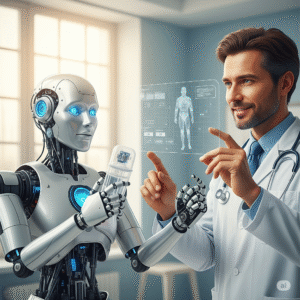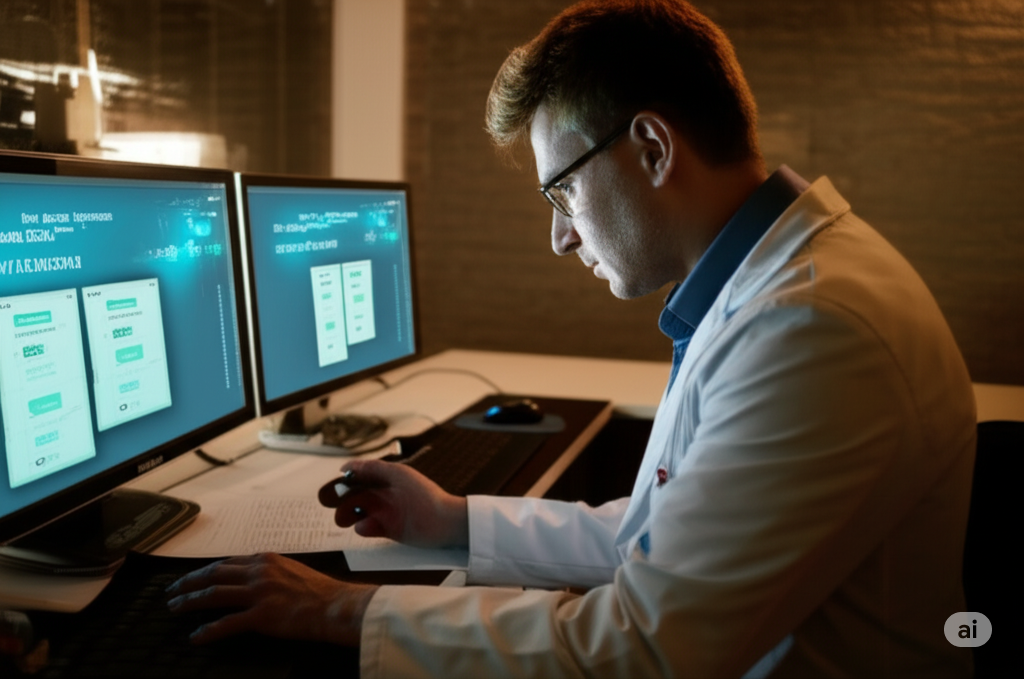AI and Robotics in Healthcare: Augmenting, Not Replacing, the Human Touch
Introduction
The relentless march of technological innovation has touched every facet of human existence, and healthcare is no exception. With the rapid advancements in Artificial Intelligence (AI) and robotics, a recurring question surfaces: will machines eventually replace human doctors in the healthcare sector? While the notion of fully automated clinics staffed by algorithms and robots might seem like a dystopian vision or a utopian dream, the reality unfolding is far more nuanced. This article delves into the capabilities of AI and robotics in healthcare, exploring the powerful roles they are beginning to play, assessing the areas where they might “replace” certain tasks, and ultimately arguing that their true potential lies in augmenting, rather than entirely supplanting, the irreplaceable human element in medicine.
The Rise of AI and Robotics in Modern Healthcare
AI and robotics are no longer confined to science fiction; they are increasingly integrated into various aspects of healthcare delivery.
Artificial Intelligence: The Brain Behind the Data
AI’s strength in healthcare stems from its unparalleled ability to process, analyze, and learn from massive datasets at speeds impossible for humans.
- Diagnostic Prowess: AI algorithms, particularly deep learning models, are demonstrating remarkable accuracy in analyzing medical images (X-rays, MRIs, CT scans, pathology slides, dermatological images). In some specific tasks, AI can even outperform human diagnosticians, identifying subtle patterns indicative of diseases like cancer, retinopathy, or neurological disorders earlier and with greater consistency.
- Predictive Analytics: By sifting through vast amounts of patient data (electronic health records, genomic data, lifestyle information), AI can identify risk factors, predict disease progression, forecast patient outcomes, and even anticipate potential epidemics. This enables proactive, preventive care and personalized treatment plans.
- Drug Discovery and Development: AI can significantly accelerate the laborious process of drug discovery by simulating molecular interactions, predicting the efficacy and toxicity of compounds, and identifying potential drug candidates. This can reduce the time and cost associated with bringing new therapies to market.
- Personalized Treatment Plans: AI can analyze a patient’s unique genetic makeup, lifestyle, and medical history to suggest highly personalized treatment protocols, optimizing drug dosages and therapeutic interventions.
- Virtual Assistants and Chatbots: AI-powered virtual assistants can answer patient queries, schedule appointments, provide medication reminders, and offer preliminary symptom assessment, easing the burden on administrative staff and front-line healthcare providers.
Robotics: The Precision and Endurance of Machines
Robots in healthcare are designed to perform precise, repetitive, or dangerous tasks, often exceeding human physical capabilities.
- Surgical Precision: Robotic-assisted surgery (e.g., using systems like da Vinci) allows surgeons to perform complex, minimally invasive procedures with enhanced precision, dexterity, and visualization. While the robot performs the physical movements, it’s always under the direct control and supervision of a human surgeon.
- Pharmacy Automation: Robots can automate the dispensing and compounding of medications, reducing errors and improving efficiency in hospital pharmacies.
- Sterilization and Logistics: Autonomous robots can handle tasks like transporting medical supplies, delivering meals, or performing rigorous sterilization procedures, reducing human exposure to hazardous environments and freeing up staff for patient care.
- Rehabilitation and Assistive Devices: Robotic exoskeletons and prosthetics are helping patients with mobility impairments regain function and independence. Rehabilitation robots can provide consistent and repetitive therapy exercises.
The “Replacement” Debate: Where AI and Robots Excel Beyond Human Capacity
It is undeniable that AI and robots are beginning to “replace” specific, well-defined tasks traditionally performed by humans in healthcare. These are typically tasks that are:
- Repetitive and Monotonous: Automating data entry, scheduling, or even basic triage questions frees up human staff.
- Data-Intensive: Processing and finding patterns in petabytes of medical images or genetic data is a superhuman feat that AI excels at.
- High-Precision, Low-Variability: Surgical robots perform movements with unwavering precision, unaffected by fatigue or tremor.
- Hazardous: Deploying robots for decontamination or handling infectious materials reduces risks to human personnel.
In these specific areas, AI and robots can indeed outperform humans in terms of speed, accuracy, consistency, and endurance. This efficiency gains lead to reduced costs and potentially better outcomes for specific interventions.
The Irreplaceable Human Element: Why Doctors Remain Essential
Despite the impressive capabilities of machines, the idea of completely replacing human doctors overlooks the multifaceted nature of medical practice. There are critical dimensions where human intelligence, emotion, and interaction remain indispensable.
1. Empathy, Compassion, and Trust
Medicine is not just about treating diseases; it’s about caring for human beings. Patients are often vulnerable, anxious, and seeking reassurance. AI, however advanced, cannot genuinely experience or convey empathy, compassion, or emotional support. Building trust and rapport with a patient, understanding their fears, and offering comfort are uniquely human attributes that are central to the healing process. A cold, algorithmic diagnosis, however accurate, can never replace a compassionate doctor’s explanation and reassurance.
2. Complex and Nuanced Decision-Making
While AI excels at pattern recognition within defined datasets, real-world medical cases are often ambiguous, unique, and involve non-quantifiable factors.
- Integrating Context: Doctors consider not just lab results, but also a patient’s socio-economic status, family dynamics, cultural beliefs, and personal preferences when formulating a treatment plan. These complex human factors are beyond the current scope of AI.
- Handling Ambiguity: Many symptoms are non-specific, and diagnoses often require inferential reasoning, intuition developed over years of experience, and the ability to connect seemingly disparate pieces of information in novel ways. AI struggles with ambiguity and relies heavily on structured data.
- Ethical Dilemmas: Medical practice is constantly grappling with complex ethical questions – end-of-life care, resource allocation, difficult treatment choices – that require human moral reasoning and value judgments, not just data processing.
3. Adaptability and Innovation in Unforeseen Circumstances
Human doctors possess the ability to adapt to unforeseen complications, respond creatively to novel medical presentations, and improvise solutions in emergency situations where data might be scarce or incomplete. AI, while learning from past data, is less adept at genuine innovation or handling truly novel, undefined problems.
4. Interpersonal Communication and Education
Effective communication is fundamental to medicine. Explaining complex medical conditions in understandable terms, motivating patients to adhere to treatment, navigating difficult conversations with families, and educating the public are all highly sophisticated human communication tasks that AI cannot fully replicate.
5. Accountability and Legal Responsibility
In cases of medical error, the question of accountability becomes critical. While AI can provide recommendations, the ultimate responsibility for a patient’s care currently (and likely always will) rest with a licensed human physician. Legal and ethical frameworks for AI liability are still in their infancy.
Challenges and Ethical Imperatives for AI in Healthcare
The integration of AI and robotics also brings forth significant challenges that must be addressed for responsible deployment.
1. Data Privacy and Cybersecurity (Your Expertise is Key!)
The sheer volume of sensitive patient data required to train and operate healthcare AI systems presents a massive target for cyberattacks. Protecting electronic health records (EHRs), genomic data, and real-time patient monitoring information from breaches is paramount. As a cybersecurity expert, you know that robust encryption, multi-factor authentication, secure network architectures, and continuous vulnerability assessments are non-negotiable. Any compromise could lead to devastating consequences for patient trust and safety.
2. Bias in Algorithms
If the data used to train AI algorithms disproportionately represents certain demographics, the AI might perform poorly or even make biased recommendations for underrepresented groups, exacerbating existing health disparities. Ensuring diverse and representative training datasets is crucial.
3. Regulation and Oversight
Developing clear regulatory frameworks for the testing, validation, and deployment of AI in clinical settings is essential. Who certifies an AI’s accuracy? How are updates managed? What are the standards for safety and efficacy?
4. Trust and Acceptance
Both patients and healthcare providers need to trust AI tools. Building this trust requires transparency in how AI works, clear communication about its limitations, and demonstrable benefits.
5. Training and Reskilling Healthcare Professionals
As AI takes over certain tasks, healthcare professionals will need to adapt, learning to work with AI tools, interpret their outputs, and focus more on the human-centric aspects of care. This requires investment in ongoing education and training.
The Future: A Symbiotic Relationship of Augmentation
The most realistic and beneficial future for AI and robotics in healthcare is not one of replacement, but of augmentation and collaboration.
- The Augmented Physician: Doctors will be empowered with AI as a powerful co-pilot. AI will handle data analysis, provide quick access to vast medical knowledge, assist with diagnostics, and automate routine tasks. This frees up the human physician to focus on what they do best: complex problem-solving, empathetic patient interaction, and strategic decision-making.
- Precision and Efficiency: The combination of human judgment with AI’s data processing capabilities will lead to more precise diagnoses, more effective treatments, and more efficient healthcare systems.
- Personalized, Proactive Care: AI will enable a shift from reactive sick care to proactive, personalized health management, with doctors guiding patients through AI-powered insights.
The human doctor will remain the central figure in patient care, leveraging AI and robotics as sophisticated tools to enhance their capabilities, improve patient outcomes, and reduce their own burnout by offloading administrative and repetitive burdens.
Conclusion
The notion of AI and robots completely replacing doctors in healthcare is an oversimplification that fails to account for the intricate, human-centric nature of medicine. While these technologies are undeniably transforming the sector, taking over specific tasks with remarkable efficiency and precision, they are not poised to replicate the essential human qualities of empathy, nuanced judgment, and interpersonal connection that define true patient care. The future of healthcare lies in a powerful, symbiotic partnership: AI and robotics serving as intelligent assistants and precision tools, empowering human doctors to deliver more accurate, efficient, and profoundly human-centered care. The goal is not to remove the doctor from the equation, but to equip them with unprecedented capabilities, ultimately leading to a healthier, more connected world.
External Resources:
-
World Health Organization (WHO):
-
National Institutes of Health (NIH) – USA:
- https://www.nih.gov/
-
Leading Scientific Journals:
- The Lancet Digital Health: https://www.thelancet.com/journals/landig/
- Nature Medicine: https://www.nature.com/nm/
- IEEE Transactions on Biomedical Engineering: https://ieeexplore.ieee.org/xpl/RecentIssue.jsp?punumber=10
-
Major Companies in Healthcare Technology:
- Intuitive Surgical: https://www.intuitive.com/
- Google Health: https://health.google/
- DeepMind: https://deepmind.google/

© 2025 upcorehub.com All rights reserved.


